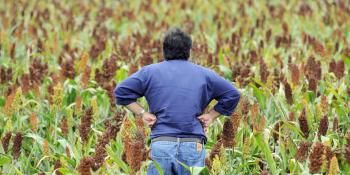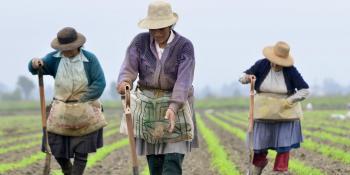‘Triple wins’ or ‘triple faults’?: Unpacking the equity implications of climate-smart agriculture

New working paper highlights challenges in the discussions surrounding climate-smart agriculture
*Note to readers: This blog story and accompanying working paper is written by CCAFS partners and does not necessarily reflect the views of CCAFS. CCAFS is committed to continual self-reflection on its work, and critical assessments of its efforts such as this form an important part of such reflection.
Climate-smart agriculture (CSA) has gained considerable recognition in recent years among international organisations, agricultural research centres, national governments, NGOs and private sector companies. A significant part of the success behind the concept is its ‘triple wins’ agenda, which is the intuitively attractive goal of simultaneously enhancing adaptation, improving mitigation and increasing food security. However, CSA has also received sharp criticism. Critics argue that promoting CSA risks undermining livelihoods of smallholder farmers and for legitimising agro-industrial expansion, and socially and environmentally destructive activities that increases GHG emissions. More than 100 civil society organisations signed a joint letter rejecting Global Alliance for Climate Smart Agriculture in 2014 for these very reasons.
In 2016, a team of researchers from the Swedish University of Agricultural Sciences and the Institute of Development Studies, undertook an examination of the narratives surrounding CSA. After analysing a long list of publications on the topic of CSA, we argue that one of the principal areas of contestation relates to CSA’s contribution to equity. Claims regarding social equity are central to CSA, both among its supporters and opponents, yet what equity actually means in the context of CSA has been poorly theorized and discussed. To address this gap, we examine three dimensions of equity (distributive, procedural, and contextual) in relation to four key contending CSA discourses, or narratives.
How do these dimensions of equity differ? Distributive equity means the distribution of costs, risks, and benefits and is similar to economic dimensions of equity. Procedural equity is about participation and representation in decision-making. Contextual equity concerns the access, capabilities, and power of actors to gain from an intervention or mechanism.
Examining the narratives
The four narratives that are used to discuss equity in CSA are focused on (1) climate policy goals, (2) agricultural transformation, (3) agro-industry, and (4) community-based CSA approaches. Our research indicates that none of these narratives adequately addresses all three dimensions of equity. Common to the first three (climate policy, agricultural transformation, agri-business) are a strong focus on efficiency-based distributive equity, while the last (smallholder CSA) tends to focus more on needs-based distributive equity.
In all four discourses, there are efforts to increase participation of vulnerable and marginalised groups, but with arguably less attention to this in agribusiness-related discourses, which focuses on existing participation in markets. In terms of contextual equity, with a few exceptions the four discourses predominantly assume working within current institutional and political structures, with as yet very limited focus on transformation of underlying structures to improve resource access.
Three concerns stands out from our analysis of CSA’s contribution to social equity. First is the distributive equity, implying a need to acknowledge how CSA may transfer the responsibility for climate change mitigation to marginalized producers and resource managers. Second is the procedural equity perspective which reveals how CSA discourses are unlikely to fundamentally shift power to address key factors constraining a pro-poor agricultural development. Third is a focus on contextual equity which means the need to pay more attention to the institutions that support the poorest and most vulnerable groups, as well as a deeper acknowledgement of the political nature of transformations that are needed to address challenges around the agricultural sector in a changing climate.
These concerns, or perhaps ‘triple faults’, suggest that new governance architectures are needed if CSA is to be pursued in ways that are just and socially inclusive, and that CSA generally favours solutions that are easily traded over agricultural practices that are inherently local but not easily exported.
Read more
Read the full findings of our analysis in the CCAFS working paper: 'Triple wins' or 'triple faults'? Analysing policy discourse on climate-smart agriculture (CSA)
Linus Karlsson is a PhD Student at the Department of Urban and Rural Development, Swedish University of Agricultural Sciences.
Patrick Wennström is a Research Assistant at the Department of Urban and Rural Development, Swedish University of Agricultural Sciences.



